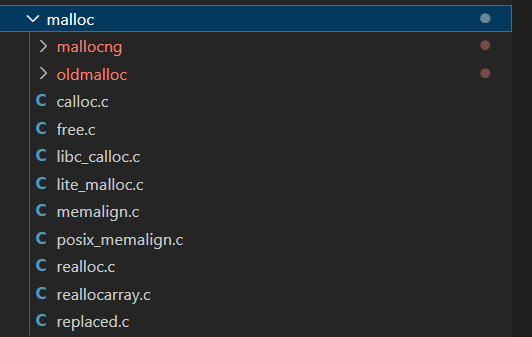Libc Musl 简析
Musl 是一个轻量级的C标准库,设计作为 GNU C library (glibc)、 uClibc 或 Android Bionic 的替代用于嵌入式操作系统和移动设备
它遵循 POSIX 2008 规格和 C99 标准,采用 MIT 许可证授权,使用 Musl 的 Linux 发行版和项目包括 sabotage, bootstrap-linux, LightCube OS 等
Libc Musl 堆管理器 - 1.1.x
1.1.x 和 1.2.x 堆管理结构几乎完全不同:

- 1.2.x 新版本使用 mallocng
- 1.1.x 旧版本使用 oidmalloc
1.1.x Musl 关键结构体
基础堆块结构体 chunk:
1
2
3
4
| struct chunk {
size_t psize, csize;
struct chunk *next, *prev;
};
|
- psize 和 csize 字段都有标志位,但只有最低位的标志位 INUSE 有效(该标记用于表示自己的状态)
- 若设置 INUSE 标志位(最低位为1),表示 chunk 正在被使用
- 若没有设置 INUSE 标志位(最低位为0),表示 chunk 已经被释放或者通过 mmap 分配的,需要通过 psize 的标志位来进一步判断 chunk 的状态
核心结构体 mal:
1
2
3
4
5
| static struct {
volatile uint64_t binmap;
struct bin bins[64];
volatile int free_lock[2];
} mal;
|
- 64 位无符号整数 binmap,记录每个 bin 是否为非空
- 前面 32 个 bin 存放的 chunk 大小固定,而后面的存放一定范围的 chunk
空闲循环链表 bin:
1
2
3
4
5
| struct bin {
volatile int lock[2];
struct chunk *head;
struct chunk *tail;
};
|
- head 和 tail 指针分别指向首部和尾部的 chunk
- 首部 chunk 的 prev 指针和尾部 chunk 的 next 指针指向 bin 链表头部
1.1.x Musl 关键函数
申请函数 malloc:
1
2
3
4
5
6
7
8
9
10
11
12
13
14
15
16
17
18
19
20
21
22
23
24
25
26
27
28
29
30
31
32
33
34
35
36
37
38
39
40
41
42
43
44
45
46
47
48
| void *malloc(size_t n)
{
struct chunk *c;
int i, j;
if (adjust_size(&n) < 0) return 0;
if (n > MMAP_THRESHOLD) {
size_t len = n + OVERHEAD + PAGE_SIZE - 1 & -PAGE_SIZE;
char *base = __mmap(0, len, PROT_READ|PROT_WRITE,
MAP_PRIVATE|MAP_ANONYMOUS, -1, 0);
if (base == (void *)-1) return 0;
c = (void *)(base + SIZE_ALIGN - OVERHEAD);
c->csize = len - (SIZE_ALIGN - OVERHEAD);
c->psize = SIZE_ALIGN - OVERHEAD;
return CHUNK_TO_MEM(c);
}
i = bin_index_up(n);
for (;;) {
uint64_t mask = mal.binmap & -(1ULL<<i);
if (!mask) {
c = expand_heap(n);
if (!c) return 0;
if (alloc_rev(c)) {
struct chunk *x = c;
c = PREV_CHUNK(c);
NEXT_CHUNK(x)->psize = c->csize =
x->csize + CHUNK_SIZE(c);
}
break;
}
j = first_set(mask);
lock_bin(j);
c = mal.bins[j].head;
if (c != BIN_TO_CHUNK(j)) {
if (!pretrim(c, n, i, j)) unbin(c, j);
unlock_bin(j);
break;
}
unlock_bin(j);
}
trim(c, n);
return CHUNK_TO_MEM(c);
}
|
unlink 操作函数 unbin:
1
2
3
4
5
6
7
8
9
| static void unbin(struct chunk *c, int i)
{
if (c->prev == c->next)
a_and_64(&mal.binmap, ~(1ULL<<i));
c->prev->next = c->next;
c->next->prev = c->prev;
c->csize |= C_INUSE;
NEXT_CHUNK(c)->psize |= C_INUSE;
}
|
- 在 libc 中会有
c->prev->next == c && c->next->prev == c 的检查,而这里没有
释放函数 free:
1
2
3
4
5
6
7
8
9
10
11
| void free(void *p)
{
if (!p) return;
struct chunk *self = MEM_TO_CHUNK(p);
if (IS_MMAPPED(self))
unmap_chunk(self);
else
__bin_chunk(self);
}
|
1
2
3
4
5
6
7
8
9
10
11
12
13
14
15
16
17
18
19
20
21
22
23
24
25
26
27
28
29
30
31
32
33
34
35
36
37
38
39
40
41
42
43
44
45
46
47
48
49
50
51
52
53
54
55
56
57
58
59
60
61
62
63
64
65
66
67
68
| void __bin_chunk(struct chunk *self)
{
struct chunk *next = NEXT_CHUNK(self);
size_t final_size, new_size, size;
int reclaim=0;
int i;
final_size = new_size = CHUNK_SIZE(self);
if (next->psize != self->csize) a_crash();
for (;;) {
if (self->psize & next->csize & C_INUSE) {
self->csize = final_size | C_INUSE;
next->psize = final_size | C_INUSE;
i = bin_index(final_size);
lock_bin(i);
lock(mal.free_lock);
if (self->psize & next->csize & C_INUSE)
break;
unlock(mal.free_lock);
unlock_bin(i);
}
if (alloc_rev(self)) {
self = PREV_CHUNK(self);
size = CHUNK_SIZE(self);
final_size += size;
if (new_size+size > RECLAIM && (new_size+size^size) > size)
reclaim = 1;
}
if (alloc_fwd(next)) {
size = CHUNK_SIZE(next);
final_size += size;
if (new_size+size > RECLAIM && (new_size+size^size) > size)
reclaim = 1;
next = NEXT_CHUNK(next);
}
}
if (!(mal.binmap & 1ULL<<i))
a_or_64(&mal.binmap, 1ULL<<i);
self->csize = final_size;
next->psize = final_size;
unlock(mal.free_lock);
self->next = BIN_TO_CHUNK(i);
self->prev = mal.bins[i].tail;
self->next->prev = self;
self->prev->next = self;
if (reclaim) {
uintptr_t a = (uintptr_t)self + SIZE_ALIGN+PAGE_SIZE-1 & -PAGE_SIZE;
uintptr_t b = (uintptr_t)next - SIZE_ALIGN & -PAGE_SIZE;
#if 1
__madvise((void *)a, b-a, MADV_DONTNEED);
#else
__mmap((void *)a, b-a, PROT_READ|PROT_WRITE,
MAP_PRIVATE|MAP_ANONYMOUS|MAP_FIXED, -1, 0);
#endif
}
unlock_bin(i);
}
|
1.1.x Musl 堆排布
在堆初始化之后,程序会自动生成一个基于 libc 基地址的 chunk 和一个基于程序基地址的 chunk
1
2
3
4
5
6
7
8
9
10
11
12
13
14
15
16
17
18
| pwndbg> p /x mal
$3 = {
binmap = 0x4000000000,
bins = {{
lock = {0x0, 0x0},
head = 0x0,
tail = 0x0
} <repeats 38 times>, {
lock = {0x0, 0x0},
head = 0x6021f0,
tail = 0x7f02cb591350
}, {
lock = {0x0, 0x0},
head = 0x0,
tail = 0x0
} <repeats 25 times>},
free_lock = {0x0, 0x0}
}
|
- 最开始申请的堆都会从这两个 chunk 中切割,直到有更合适的 chunk 出现
